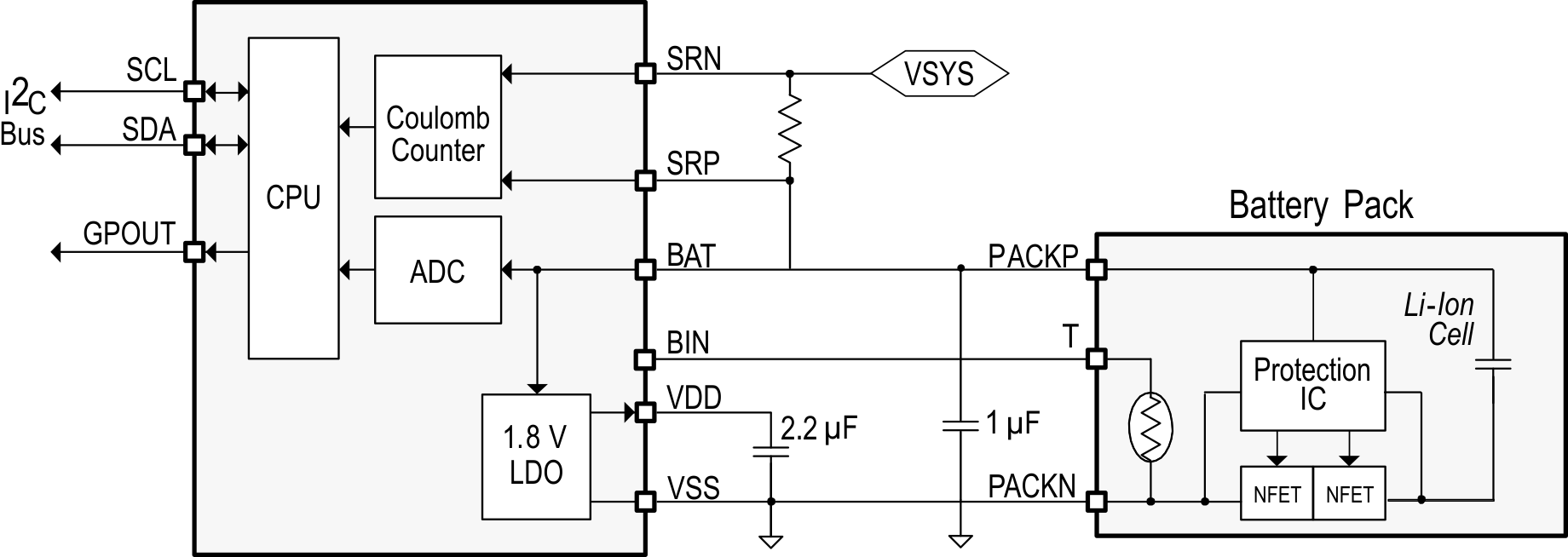SLUSCB7A March 2016 – April 2016
PRODUCTION DATA.
- 1 Features
- 2 Applications
- 3 Description
- 4 Revision History
- 5 Pin Configuration and Functions
-
6 Specifications
- 6.1 Absolute Maximum Ratings
- 6.2 ESD Ratings
- 6.3 Recommended Operating Conditions
- 6.4 Thermal Information
- 6.5 Supply Current
- 6.6 Digital Input and Output DC Characteristics
- 6.7 LDO Regulator, Wake-up, and Auto-Shutdown DC Characteristics
- 6.8 LDO Regulator, Wake-up, and Auto-shutdown AC Characteristics
- 6.9 ADC (Temperature and Cell Measurement) Characteristics
- 6.10 Integrating ADC (Coulomb Counter) Characteristics
- 6.11 I2C-Compatible Interface Communication Timing Characteristics
- 6.12 SHUTDOWN and WAKE-UP Timing
- 6.13 Typical Characteristics
- 7 Detailed Description
- 8 Application and Implementation
- 9 Power Supply Recommendation
- 10Layout
- 11Device and Documentation Support
- 12Mechanical, Packaging, and Orderable Information
Package Options
Mechanical Data (Package|Pins)
- YZF|9
Thermal pad, mechanical data (Package|Pins)
Orderable Information
1 Features
- Single-Cell Li-Ion Battery Fuel Gauge
- Resides in Pack or on System Board
- Supports Embedded or Removable Batteries
- Powers Directly from Battery with Integrated LDO
- Supports a Low-Value (10-mΩ) External Sense Resistor
- Ultra-Low Power Consumption in NORMAL (50 µA) and SLEEP (9 µA) Modes
- Battery Fuel Gauging Based on Compensated End-of-Discharge Voltage (CEDV) Technology
- Reports Remaining Capacity and State-of-Charge (SOC) with Smoothing Filter
- Adjusts Automatically for Battery Aging, Self-Discharge, Temperature, and Rate Changes
- Provides Battery State-of-Health (Aging) Estimation
- Microcontroller Peripheral Supports:
- 400-kHz I2C™ Serial Interface
- Configurable SOC Interrupt OR
Battery Low Digital Output Warning - Internal Temperature Sensor OR
Host-Reported Temperature OR
External Thermistor
2 Applications
- Smartphones and Feature Phones
- Tablets
- Wearables
- Building Automation
- Portable Medical/Industrial Handsets
- Portable Audio
- Gaming
3 Description
The Texas Instruments bq27220 battery fuel gauge is a single-cell gauge that requires minimal user-configuration and system microcontroller firmware development, leading to quick system bring-up. The bq27220 device uses the Compensated End-of-Discharge Voltage (CEDV) algorithm for fuel gauging, and provides information such as remaining battery capacity (mAh), state-of-charge (%), runtime-to-empty (min), battery voltage (mV), temperature (°C), and state-of-health (%).
The bq27220 battery fuel gauge has ultra-low power consumption in NORMAL (50 μA) and SLEEP (9 μA) modes, leading to longer battery runtime. Configurable interrupts help save system power and free up the host from continuous polling. Accurate temperature sensing is supported via an external thermistor.
Customers can use preloaded CEDV parameters in ROM or can generate custom chemistry parameters using TI's web-based tool, GAUGEPARCAL. Custom-generated parameters can be either programmed in the device RAM by the host on power up of the system or customers can program the parameters to an onboard One-Time Programmable (OTP) memory.
Battery fuel gauging with the bq27220 device requires connections only to PACK+ (P+) and PACK– (P–) for a removable battery pack or embedded battery circuit. The tiny, 9-ball, 1.62 mm × 1.58 mm, 0.5-mm pitch NanoFree™ chip scale package (DSBGA) is ideal for space-constrained applications.
Device Information(1)
| PART NUMBER | PACKAGE | BODY SIZE (NOM) |
|---|---|---|
| bq27220 | YZF (9) | 1.62 mm × 1.58 mm |
- For all available packages, see the orderable addendum at the end of the data sheet.
Simplified Schematic (System-Side)

4 Revision History
| DATE | REVISION | NOTES |
|---|---|---|
| April 2016 | A | PRODUCT PREVIEW to Production Data |